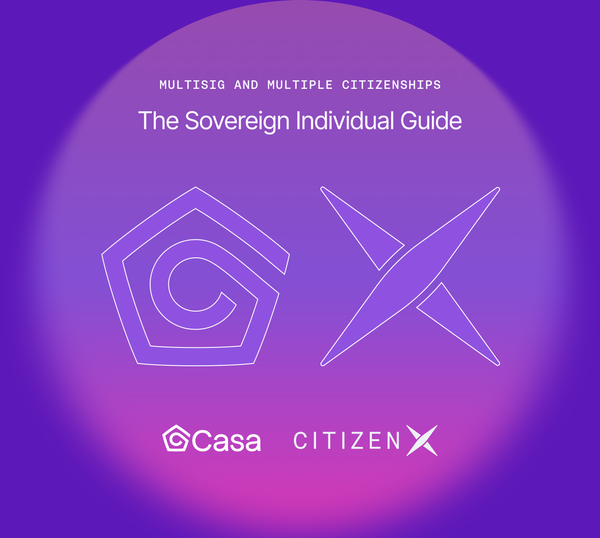In a world where wealth and identity are increasingly borderless, securing your digital assets has never been more crucial. As Bitcoin continues its journey into the mainstream of global finance, the question of custody—who holds and protects your digital gold—has become central to wealth preservation across jurisdictions.
For citizens navigating multiple passports, residencies, and investment opportunities, choosing the right Bitcoin custodian isn't just about security—it's about maintaining flexibility in an ever-changing regulatory landscape.
Let's explore the best Bitcoin custody solutions available in 2025, with special attention to how they serve the needs of internationally mobile individuals and families seeking both security and sovereignty over their digital wealth.
The Custody Question: Who Holds Your Keys?
Before diving into specific providers, let's clarify what Bitcoin custody actually means.
At its core, custody refers to who controls the private keys that allow Bitcoin to be moved. Unlike traditional assets held by banks or brokerages, Bitcoin operates on a "bearer asset" model—whoever controls the private keys controls the coins, full stop.
This presents both tremendous freedom and significant responsibility. For high-net-worth individuals and family offices, the custody question involves balancing security, accessibility, regulatory compliance, and jurisdictional diversification.
Today's custody landscape falls into two broad categories: qualified custodians (regulated financial institutions) and self-custody solutions (where you maintain control of your keys). Each approach offers distinct advantages depending on your circumstances and global mobility needs.
U.S. Qualified Custodians: Where Regulation Meets Digital Innovation
For those seeking maximum regulatory clarity, especially when wealth intersects with U.S. jurisdiction, several American institutions stand at the forefront of Bitcoin custody.
Coinbase Custody
Coinbase Custody operates as a limited-purpose trust chartered by the New York Department of Financial Services, making it a qualified custodian under U.S. investment laws—critical for those with formal wealth management structures.
Security highlights include a substantial $320 million commercial crime insurance policy covering both cold storage and hot wallets. Their multi-layered security employs offline cold storage with distributed key sharding across geographically dispersed vaults.
What makes Coinbase particularly attractive is their track record—zero loss of client assets in over 12 years of operation—and their clear segregation of assets. Each client's coins reside in unique blockchain addresses, allowing for independent verification of holdings.
For those concerned about cross-border complications, Coinbase's status as custodian for 8 of the 11 U.S. spot Bitcoin ETF applications speaks to their regulatory standing. The custody fee of around 0.50% annually (with a $1 million minimum) reflects their institutional focus.
Gemini Custody
Like Coinbase, Gemini operates under a New York State trust charter, functioning as a qualified custodian and fiduciary. What sets them apart is their insurance coverage—one of the largest in the crypto custody market at $200 million for cold storage assets, plus an additional $90 million for hot wallet coverage.
For international wealth planning, Gemini offers noteworthy FDIC "pass-through" insurance for U.S. dollar balances, providing an additional layer of protection during currency transitions.
Their security architecture centers on "air-gapped" cold storage with keys generated and stored on hardware security modules never connected to the internet. These facilities are geographically distributed, with no single person able to access the vaults without multilayer credentials.
At a 0.40% annual fee and approximately $100,000 minimum, Gemini positions itself as slightly more accessible than Coinbase while maintaining institutional-grade security.
BitGo Trust
BitGo's regulatory profile makes it particularly interesting for globally mobile clients. Beyond its South Dakota trust charter, BitGo secured a New York Trust Charter in 2021 and a crypto custody license in Germany (BaFin) in October 2023.
This multi-jurisdictional approach allows BitGo to serve as a bridge between U.S. and European regulatory frameworks—helpful for families with presence in both regions.
Their $250 million Lloyd's of London insurance policy covers theft of private keys, insider dishonesty, and physical loss of keys. BitGo pioneered multi-signature wallets in crypto custody, typically using a 3-key system with various configurations possible.
For those seeking more active involvement, BitGo enables a co-managed custody model where a client can hold one key while BitGo holds others and acts as co-signer—a middle ground for those not fully comfortable with third-party custody.
Fees range from 0.6-1.8% annually with a typical $1 million minimum, reflecting their more technology-focused approach and flexibility.
Anchorage Digital Bank
Anchorage made history in January 2021 as the first federally chartered crypto bank in the U.S., receiving a charter from the Office of the Comptroller of the Currency. This unique status as a national trust bank makes it qualified by definition for SEC custody requirements.
Their global expansion continued with Anchorage Digital Singapore earning a Major Payment Institution license from MAS in November 2024, making them attractive for those with ties to Asian financial centers.
Unlike traditional cold storage providers, Anchorage uses "active custody" combining Hardware Security Modules, enclave computing, and biometric multi-factor authentication. This approach enables near real-time transactions without compromising security—no keys are ever exposed, even when in use.
Their selection by the U.S. Marshals Service to custody seized crypto assets underscores their security credibility. For family offices with global exposure, Anchorage's model allows rapid deployment of Bitcoin for short-term liquidity needs while maintaining institutional-grade security.
Fidelity Digital Assets
The entry of traditional financial giants like Fidelity into crypto custody offers reassurance to conservative wealth managers. Fidelity Digital Assets secured a New York State Trust Charter in 2019, making it a qualified custodian regulated by NYDFS.
Leveraging Fidelity's decades-old trust entities and massive balance sheet provides implicit backing that many find comforting, even without explicit insurance disclosures for crypto custody.
Their multi-tier storage approach keeps the majority of assets in deep cold storage while maintaining a smaller portion in a warm environment for quicker access. Fees around 0.35% annually make them competitively priced among institutional custodians.
For families with existing Fidelity relationships, their integrated reporting allows viewing crypto alongside traditional assets—simplifying wealth management across borders and asset classes.
Bank of New York Mellon Digital
As the first G-SIB (Global Systemically Important Bank) to offer crypto custody, BNY Mellon brings unparalleled institutional credibility to the space. Operating under its NY state-chartered trust bank license, BNY Mellon leverages centuries of custody experience.
Their security approach utilizes MPC-based technology (integrated with Fireblocks) and bank-grade compliance monitoring via Chainalysis. Few details of their insurance coverage are public, but their enormous balance sheet provides implicit protection.
For citizenship planning and global mobility, having assets held by a bank of BNY Mellon's stature can dramatically simplify proofs of wealth and source of funds for immigration authorities or foreign banks—a significant advantage when establishing yourself in a new jurisdiction.
International Custodians: Jurisdictional Diversity
For those specifically concerned with jurisdictional diversification or non-U.S. regulatory frameworks, several international options merit consideration.
Zodia Custody (UK/Singapore)
Launched in 2021 as a joint venture between Standard Chartered and Northern Trust, Zodia represents traditional banking's thoughtful entry into crypto custody.
Registered with the UK Financial Conduct Authority and pursuing licenses in other jurisdictions (including Abu Dhabi's ADGM), Zodia offers a comprehensive insurance program covering both digital asset crime and cyber incidents.
Their bank-grade platform combines multi-signature and MPC approaches, with SOC 1 and ISO 27001 certifications attesting to their controls. In November 2024, they partnered with Raffles Family Office Group to provide custody for their ultra-wealthy clients throughout Asia.
For those establishing presence in financial hubs like London, Singapore, or the UAE, Zodia's connection to Standard Chartered's global banking network offers practical advantages for wealth verification and management.
Sygnum Bank (Switzerland)
As one of two crypto-specialist banks in Switzerland with a full banking and securities dealer license from FINMA, Sygnum brings Swiss banking tradition to digital assets.
While their insurance coverage is more limited than some (focused on internal fraud protection), Swiss law provides robust safeguards for custody assets. Their security architecture employs Hardware Security Modules in geographically redundant Swiss data centers, with all assets held off-balance sheet.
Swiss banking law ensures that custody assets like crypto are segregated property—if Sygnum went bankrupt, client crypto would be returned to clients rather than counting in the bankruptcy estate.
For high-net-worth individuals establishing Swiss residency or banking relationships, Sygnum's integration of crypto with traditional banking features creates a seamless experience across asset classes.
SEBA Bank (Switzerland)
Another Swiss licensed crypto bank, SEBA offers insured custody up to CHF 150M via Lloyd's insurers according to some reports. Like Sygnum, it operates under full FINMA regulation and banking license.
SEBA has expanded beyond Switzerland with offices in Hong Kong and Abu Dhabi, making it attractive for families with multi-jurisdictional presence in Europe, Asia, and the Middle East.
The bank's white-label custody solutions are used by several European private banks, providing a bridge between traditional wealth management and digital asset security.
Xapo Bank (Gibraltar)
Originally one of the earliest Bitcoin custodians known for its mountain bunker vault in Switzerland, Xapo evolved to become a licensed bank in Gibraltar in 2021.
While Xapo offers deposit guarantees for fiat (up to €100k through Gibraltar's scheme), they notably rely on their security reputation rather than insurance for crypto protection. Their approach uses 100% cold storage with manual withdrawals taking 24-48 hours—prioritizing security over convenience.
Xapo has gained popularity among early Bitcoin adopters seeking banking services integrated with Bitcoin custody. Their international wire capabilities help crypto-rich clients bridge to fiat for property purchases or other wealth diversification needs.
In 2023, they began offering interest on Bitcoin deposits through lending protocol integration—one of the first banks to do so while maintaining custody security.
Self-Custody Solutions: Maximum Control
For those prioritizing direct control and jurisdictional neutrality, self-custody offers compelling advantages—particularly for internationally mobile individuals.
Hardware Wallets (Cold Storage Devices)
The most basic form of self-custody involves hardware wallets from manufacturers like Ledger (France), Trezor (Czech Republic), and Coldcard (Canada). These dedicated devices store private keys offline, requiring physical confirmation of transactions.
The appeal is profound: a hardware wallet allows you to literally cross borders with your wealth in your pocket—impossible with gold or large amounts of cash. This has enabled high-net-worth individuals from unstable countries to relocate with their wealth intact.
However, self-custody places full responsibility on the user. There's no insurance, no recovery service, and typically no recourse if mistakes occur. Many wealthy individuals mitigate this by storing their seed phrase backups in bank safety deposit boxes across multiple countries.
Multi-Signature Wallets & Collaborative Custody
More sophisticated self-custody approaches use multi-signature setups requiring multiple keys to move funds. Services like Unchained Capital and Casa have emerged to assist with these arrangements.
Unchained Capital offers a vault where clients hold 2 of 3 keys and Unchained holds 1 as a co-signer. This service typically costs $250 annually for personal use, with higher tiers available for institutional needs.
Casa takes a similar approach with their flagship 3-of-5 multisig setup, where the user controls multiple keys across different devices and locations. Their Diamond tier (~$5,000/year) includes concierge support and inheritance planning—solving the critical question of how heirs access your Bitcoin.
For global families, these collaborative approaches allow distribution of keys among family members in different countries while maintaining a safety net through the service provider.
Institutional Self-Custody Platforms
For family offices with internal capabilities, enterprise platforms like Fireblocks, Ledger Enterprise, and Metaco Harmonize enable sophisticated in-house custody.
Fireblocks uses MPC technology to manage crypto with fine-grained controls, whitelists, and multi-user approvals. Ledger Enterprise offers server-based solutions using Ledger hardware with notable insurance coverage—one of the few ways to insure self-custody.
These solutions typically require significant technical expertise and carry substantial costs, but provide institutional security while maintaining direct control over assets.
Key Considerations
When selecting a Bitcoin custody solution in 2025, several factors deserve special attention for those with international lifestyles and assets.
Regulatory Recognition
For those engaged in citizenship-by-investment programs or residency applications, the regulatory status of your custodian can significantly impact wealth verification processes.
A qualified custodian can provide formal statements and attestations that immigration authorities and foreign banks readily accept. Self-custody, while offering maximum control, may require additional documentation to satisfy due diligence requirements when establishing yourself in a new jurisdiction.
Jurisdictional Diversification
Just as the wealthy have historically diversified banking relationships across countries, prudent Bitcoin investors often split custody across jurisdictions.
A U.S. custodian might offer strong regulatory protection and insurance, while a Swiss bank provides neutrality and privacy. Self-custody provides a third layer entirely outside the banking system. This diversification strategy hedges against regulatory changes or geopolitical tensions affecting any single jurisdiction.
Immigration and Wealth Verification
When applying for investor visas or citizenship programs, proving the source and legitimacy of your wealth is often the most challenging requirement.
Major custodians like BNY Mellon, Fidelity, or Swiss banks can provide documentation that more easily satisfies these requirements than attempting to verify self-custodied Bitcoin. Some wealthy individuals temporarily move Bitcoin to regulated custodians specifically for the wealth verification phase of immigration processes.
Cross-Border Accessibility
Consider how easily you can access and deploy your Bitcoin across different jurisdictions. Some custodians offer global operations that simplify access regardless of your location.
For example, a family office relocating from the U.S. to Singapore might custody Bitcoin with Anchorage, which has regulatory standing in both countries. Similarly, Fidelity's global presence enables positions to be mirrored between entities for local access.
Fee Structures and Minimums
While security should be the primary concern, fee differences can be substantial for large holdings. Annual custody fees typically range from 0.25% to 0.50% at major institutions, with minimums from $100,000 to $1 million.
For a $10 million Bitcoin position, the difference between 0.25% and 0.50% represents $25,000 annually. However, these fees often become negotiable for very large positions, and some custodians offer tiered pricing.
Special Use Cases
Certain situations unique to globally mobile individuals deserve specific custody considerations.
Citizenship-by-Investment Programs
When applying for economic citizenship in countries like St. Kitts, Dominica, or Malta, verifying investment funds often requires formal banking documentation.
Using a custodian like Gemini or BNY Mellon allows you to provide official statements showing your Bitcoin holdings. Some citizenship programs have begun explicitly accepting crypto wealth, but typically require it to be held at recognized financial institutions during the application process.
Purchasing Property Internationally
Converting Bitcoin to fiat for real estate purchases abroad often triggers banking questions about source of funds.
Having Bitcoin in a regulated custodian with clear transaction history simplifies this process. Services like Gemini's "Instant Trade" allow you to sell Bitcoin quickly while it remains in cold storage, facilitating time-sensitive property transactions.
Estate Planning Across Borders
For families with members in multiple countries, crypto inheritance planning presents unique challenges.
Casa's inheritance protocol allows predetermined heirs to access funds using a combination of keys. Similarly, Anchorage and other qualified custodians can work with executors across jurisdictions to ensure proper transfer according to wills or trusts.
Some high-net-worth individuals use Swiss custody banks like Sygnum specifically for their expertise in cross-border estate planning, creating structures that efficiently pass digital assets to the next generation regardless of where heirs reside.
Emergency Relocation
In uncertain times, having a portion of wealth in self-custody provides unique advantages for emergency relocation.
Hardware wallets or memorized seed phrases enable transportation of substantial wealth across borders without physical detection. This "wealth portability" has proven vital for individuals needing to exit countries experiencing political instability or asset freezes.
The Future of Bitcoin Custody
As we look beyond 2025, several trends will shape how internationally mobile individuals secure their Bitcoin.
Integration between traditional and digital finance continues to deepen, with major banks now offering Bitcoin custody alongside conventional assets. This normalization simplifies wealth verification for immigration purposes and cross-border financial planning.
Multi-jurisdictional custody networks are emerging—custodians with regulated entities in multiple key jurisdictions allow seamless access regardless of where life and opportunity take you.
Insurance markets are maturing, with coverage limits steadily increasing as underwriters become more comfortable with the unique risks of digital assets. This provides greater peace of mind for those with substantial Bitcoin holdings.
Meanwhile, advances in cryptographic techniques like threshold signatures and secure multiparty computation continue to improve self-custody options, reducing complexity while maintaining security.
Conclusion: Finding Your Optimal Custody Solution
There is no one-size-fits-all Bitcoin custody solution, particularly for those navigating multiple jurisdictions and cross-border wealth considerations.
Many sophisticated citizens employ a tiered approach: keeping a portion with qualified custodians for formal financial verification, while maintaining some Bitcoin in self-custody for maximum sovereignty and portability.
The best approach balances your unique needs for security, regulatory clarity, geographical access, and privacy. A Swiss family office might prioritize the long banking tradition of SEBA or Sygnum, while a tech entrepreneur moving between Silicon Valley and Singapore might favor Anchorage's dual-jurisdiction presence.
For substantial Bitcoin holdings, consider dividing assets across multiple custody solutions—perhaps keeping 60% with a qualified custodian like Coinbase or Gemini, 30% in a collaborative custody arrangement with Casa or Unchained, and 10% on hardware wallets for immediate access during travel.
As Bitcoin continues its transformation from a speculative asset to a recognized store of value, the custody solutions serving it have matured accordingly. Today's citizens have unprecedented options for securing their digital wealth across borders while maintaining both security and sovereignty.
Whether preparing for citizenship applications, planning international investments, or simply securing your wealth for future generations, the Bitcoin custody landscape of 2025 offers sophisticated solutions for every need.
The key is matching your custody approach to your global lifestyle—balancing institutional protection with the freedom and flexibility that drew many to Bitcoin in the first place.
This article is for informational purposes only and does not constitute legal, tax, or investment advice. Consult with appropriate professionals regarding your specific situation.




